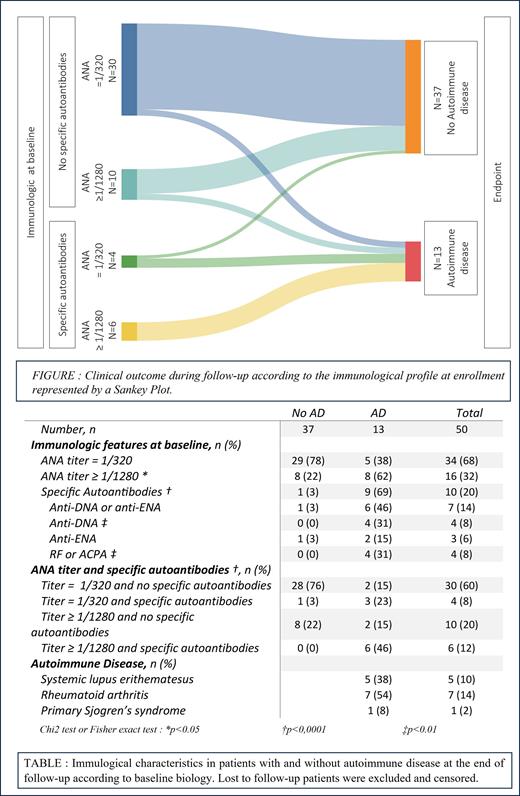Introduction: Sickle cell disease (SCD), the most frequent genetic disorder, can be associated with systemic autoimmune diseases (ADs). High levels of antinuclear antibodies (ANA) are commonly described in SCD, as alloimmunization after blood transfusion. However, the specificity and the prognostic value of ANA have not been fully determined.
We aimed to evaluate the association of ANA with AD development during long-term follow-up in SCD patients. Our secondary goal was to assess mortality and serious SCD-related events in this population.
Patients and methods: We conducted a single-center longitudinal cohort study on 66 adult SCD patients with ANA titers ≥1/320 at baseline followed over a 13 year-period. Patients known to have an AD (n=9) were excluded from the risk analysis.
Results: During follow-up, 13 out of 57 patients (23%) developed AD. Patients with ANA titers ≥1/1280 had a 3-fold increased risk of developing AD (RR 3.4[1.4;8.6]) and a 9-fold increased risk in the presence of specific autoantibodies (anti-DNA, anti-ENA, RF or ACPA) (RR 9.0[3.7;23]) with a positive (PPV) and negative predictive value (NPV) of 90%. When these two immunological features were associated, specificity and PPV reached 100%, with a NPV of 84%. There was no significant difference in the occurrence of serious SCD-related events or mortality rate according to AD.
Conclusions: Sickle cell patients with high level of antinuclear antibodies and specific autoantibodies are at high risk of developing AD. The occurrence of AD does not seem to have a significant impact on the course and severity of SCD.
Disclosures
Michel:UCB: Honoraria; Sobi: Consultancy; Novartis: Consultancy; Alexion: Consultancy; argenx: Honoraria; Sanofi: Consultancy.


This feature is available to Subscribers Only
Sign In or Create an Account Close Modal